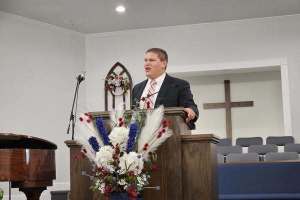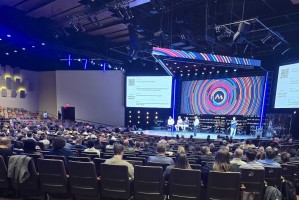What's a Christian to Do on the Day of Silence?
"Please understand my reasons for not speaking today. I am participating in the Day of Silence (DOS), a national youth movement bringing attention to the silence faced by lesbian, gay, bisexual and transgender people and their allies. My deliberate silence echoes that silence, which is caused by anti-LGBT bullying, name-calling and harassment. I believe that ending the silence is the first step toward building awareness and making a commitment to address these injustices. Think about the voices you are not hearing today.
What are you going to do to end the Silence?"
-From dayofsilence.com
Or should we? Are we called to do anything to end the silence? By "we," I mean those of us who have placed our trust in Jesus Christ as our only hope of salvation. Call us "Christians," or "Christ followers." And because of those titles and the commitment that lies therein, are we called to do anything? Or can we just bury our heads in the sand and wait for the day - April 20th - to pass?
Well, head-burying is rarely an effective faith-sharing strategy. So one of the first things we must do as Christians is drop the labels and begin to see all people, regardless of whether they are living outside of God's blueprint for sexuality, as our neighbor:
Once a religion scholar stood up with a question to test Jesus. "Teacher, what do I need to do to get eternal life?"
He answered, "What's written in God's Law? How do you interpret it?"
He said, "That you love the Lord your God with all your passion and prayer and muscle and intelligence-and that you love your neighbor as well as you do yourself."
"Good answer!" said Jesus. "Do it and you'll live."
Looking for a loophole, he asked, "And just how would you define 'neighbor'?"
Jesus answered by telling a story. "There was once a man traveling from Jerusalem to Jericho. On the way he was attacked by robbers. They took his clothes, beat him up, and went off leaving him half-dead. Luckily, a priest was on his way down the same road, but when he saw him he angled across to the other side. Then a Levite religious man showed up; he also avoided the injured man.
"A Samaritan traveling the road came on him. When he saw the man's condition, his heart went out to him. He gave him first aid, disinfecting and bandaging his wounds. Then he lifted him onto his donkey, led him to an inn, and made him comfortable. In the morning he took out two silver coins and gave them to the innkeeper, saying, 'Take good care of him. If it costs any more, put it on my bill-I'll pay you on my way back.'
"What do you think? Which of the three became a neighbor to the man attacked by robbers?"
"The one who treated him kindly," the religion scholar responded.
Jesus said, "Go and do the same." (Luke 10:25-37).
Isn't this story amazing? A half dead human being who was severely bullied and beaten is left to perish by the priest and the religious guy because they didn't want to "get involved" - maybe because it might look like they were somehow endorsing a lifestyle - right? Then a Samaritan (who was a target of racism in that day) risks his own reputation, money, and even life to help a total stranger.
But this "stranger" was no outsider…according to Jesus, there are no strangers, only neighbors. And the second greatest commandment for Christ followers is to "love our neighbor as ourselves" (Mark 12:31).
A second thing we must do as believers in response to the Day of Silence is to seek out Scriptures' teaching on this topic. This is best done alongside your parents or youth leader. But here are a few observations to keep in mind as you wrestle together with the sometimes controversial issue of God's blueprint for sexuality:
• God loves lesbian, gay, bi-sexual and transgender people. He cherishes them and they are as incredibly special to Him as any of His other children.
• The Bible teaches that a homosexual lifestyle conflicts with God's blueprint for sexuality just as premarital sex, adultery, lustful thoughts, and many other dimensions of sexuality that are widely-accepted in our present culture do. The fact that these other sinful distortions of God's blueprint for sexuality are widely-accepted does not change the truth of God's Word and teaching. (See Romans 1:20-32, 1 Corinthians 6:9-11, and 1Timothy 1:9-10.)
• Whatever the sexual sin, the justification that it "feels so right" does not change the truth of God's Word. Virtually all sexual sin "feels right" at the time it is entered into - that's why humans head down those wrong paths - the present, fleeting pleasure lures us away from the reality of God's truth.
• God is not a killjoy when it comes to sexuality. The reason God gives us guidelines in Scripture for sexual behavior is that sex outside of a heterosexual marriage has destructive consequences, and it breaks His heart to see us willfully damage or destroy our lives and relationships.
• God hates all sinful behavior. Our sin, whatever it is, breaks His heart because all sinful behavior distances us in our relationship with Him and yields pain and hurt in our lives. The Bible identifies only ONE unforgivable sin and that is the choice of permanently rejecting Christ.
• Jesus looks upon us with compassion, love, forgiveness and grace, but He also desires what is best for us, and that is why God has given us the guidelines for living that are contained in the Bible.
If you find opportunities to discuss this topic with your friends as a result of the Day of Silence - dialogue, don't preach. We're all broken people in need of a redeeming relationship with our God through Jesus. Christians should be among the first to reach out toward LGBT. After all, we have Jesus as our model and He was often criticized for hanging out with the wrong people.
So what's a Christian to do with the Day of Silence?
Acknowledge the struggle it presents for you as a follower of Christ. Personally wrestle with the tension between not compromising your convictions about morality, while loving all your neighbors and sharing the good news of Jesus.





























